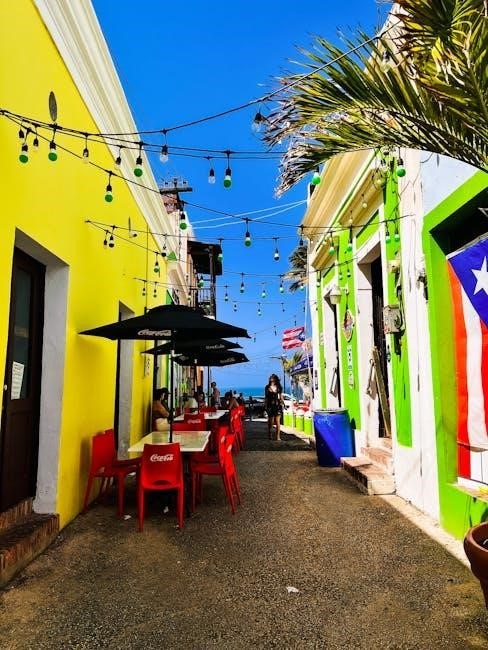Esmeralda Santiago’s memoir “When I Was Puerto Rican” is a poignant exploration of cultural identity, family, and self-discovery; The first in a trilogy, it vividly captures her childhood in Puerto Rico and her journey to the United States, offering a rich narrative of resilience and transformation.
1.1 Overview of the Memoir
When I Was Puerto Rican is a captivating autobiography by Esmeralda Santiago, detailing her childhood in rural Puerto Rico and her family’s eventual move to the United States. The memoir vividly portrays her early life amidst poverty, a tumultuous household, and the rich cultural traditions of her homeland. Santiago’s narrative voice is lyrical and evocative, offering a deeply personal account of her experiences; The book explores themes of identity, family, and resilience, making it a powerful exploration of Puerto Rican culture and the immigrant experience. As the first installment in a trilogy, it sets the stage for Santiago’s journey of self-discovery and growth, cementing its place as a significant work in Latino literature.
1.2 Author Esmeralda Santiago
Esmeralda Santiago is a renowned Puerto Rican author, best known for her memoirs and novels that explore themes of identity, culture, and resilience. Born in Puerto Rico, Santiago moved to the United States with her family at a young age, an experience that deeply influences her writing. She has authored several works, including When I Was Puerto Rican, Almost a Woman, and The Turkish Lover, as well as the novel Conquistadora. Santiago’s writing is lyrical and evocative, offering vivid portrayals of her homeland and her journey as a Latina in America. Her work has earned her critical acclaim and a dedicated readership, solidifying her place as a significant voice in Latino literature.

Cultural Identity in the Memoir
Esmeralda Santiago’s memoir delves into her journey of embracing her Puerto Rican heritage while navigating cultural duality, highlighting the richness of her traditions and her inner conflict.
2.1 The Struggle of Being Puerto Rican
Esmeralda Santiago’s memoir vividly portrays the challenges of being Puerto Rican, blending cultural pride with the struggles of poverty and colonialism. Her childhood in rural Puerto Rico is marked by a loving yet chaotic family life, where traditional values and resilience are tested by economic hardships. The memoir also reflects the broader societal tensions, as Puerto Rico transitions from Spanish colonial rule to American influence, leaving many questioning their identity and place in the world. Santiago’s personal journey mirrors the collective struggle of Puerto Ricans to maintain their cultural heritage while adapting to external pressures, creating a powerful narrative of self-discovery and resilience.
2.2 The Influence of Family and Tradition
Family and tradition play a central role in shaping Esmeralda Santiago’s identity in “When I Was Puerto Rican.” Her large, vibrant family, despite its quirks and conflicts, instills in her a deep sense of pride and connection to her Puerto Rican heritage. Traditional practices, such as music, food, and storytelling, are woven into daily life, creating a rich cultural tapestry; Santiago’s mother, in particular, emerges as a figure of strength and resilience, balancing the challenges of poverty with a steadfast commitment to family values. These traditions serve as both a source of comfort and a anchor for Santiago as she navigates the complexities of cultural identity and eventual relocation to the United States.
Themes Explored in the Book
The memoir explores themes of self-discovery, cultural identity, and socio-economic challenges, offering a vivid portrayal of resilience and transformation through the lens of personal and collective experiences.
3.1 The Journey of Self-Discovery
Esmeralda Santiago’s memoir intricately portrays her journey of self-discovery, tracing her evolution from a young girl in rural Puerto Rico to a confident woman navigating cultural shifts. Her experiences, marked by the vibrant traditions of her homeland and the stark realities of migration, reveal a deep exploration of identity. Through vivid storytelling, Santiago captures her struggles with language, belonging, and societal expectations, ultimately finding empowerment through education and resilience. This personal odyssey is not just a reflection of individual growth but also a testament to the universal quest for understanding one’s place in the world.

3.2 Social and Economic Challenges
Esmeralda Santiago’s memoir vividly portrays the social and economic challenges faced by her family in Puerto Rico and later in the United States. Growing up in poverty, she recounts the struggles of limited resources, overcrowded living conditions, and the constant battle to make ends meet; The memoir highlights the societal pressures of migration, as her family navigates the complexities of cultural adaptation. Santiago also reflects on the broader economic realities of Puerto Rico under U.S. colonial influence, which shaped her community’s experiences. Through her narrative, she sheds light on the resilience required to overcome these obstacles and the enduring impact of economic hardship on family dynamics and personal aspirations.

The Memoir’s Impact
Esmeralda Santiago’s memoir has resonated deeply with readers, offering vivid insights into Puerto Rican culture and identity. Its educational value lies in its ability to spark conversations about colonialism, migration, and personal resilience, making it a significant resource for understanding the Puerto Rican experience.
4.1 Representation of Puerto Rican Experiences
Esmeralda Santiago’s memoir offers a powerful representation of Puerto Rican experiences, blending personal and collective narratives. It captures the vibrant culture, traditions, and resilience of Puerto Rico, while also addressing themes like migration, identity, and societal challenges. The memoir provides a voice for Puerto Ricans, shedding light on their history and struggles. Santiago’s vivid storytelling highlights the complexities of growing up in Puerto Rico and navigating cultural shifts; The book has become a cornerstone in discussions about Puerto Rican identity, offering readers a deeply personal yet universally relatable perspective. Its authenticity and emotional depth have made it a vital resource for understanding the Puerto Rican experience.
4.2 Educational and Cultural Significance
Esmeralda Santiago’s memoir holds significant educational and cultural value, offering insights into Puerto Rican heritage and identity. It is widely studied in schools and universities, providing a personal lens through which students can explore themes of migration, cultural adaptation, and resilience. The book bridges generations, connecting readers to the history and traditions of Puerto Rico while highlighting the challenges of cultural assimilation. Its vivid storytelling makes it a powerful tool for teaching diversity and fostering empathy. Additionally, it has inspired discussions about identity and belonging in multicultural contexts. The memoir’s inclusion in educational curricula underscores its importance as a literary work that enriches understanding of Puerto Rican culture and its global impact.

Literary Analysis
Santiago’s lyrical prose and vivid imagery create a compelling narrative, blending personal and cultural themes. Her writing captures the essence of Puerto Rican life and migration experiences with depth and emotion.

5.1 Writing Style and Narrative Structure

Esmeralda Santiago’s writing style in When I Was Puerto Rican is lyrical and evocative, blending vivid imagery with a personal, reflective tone. Her narrative structure is both chronological and thematic, tracing her journey from rural Puerto Rico to the United States. Santiago’s prose captures the emotional depth of her experiences, balancing poignant memories of her childhood with the challenges of cultural adaptation. The memoir’s structure allows for a seamless transition between past and present, creating a layered exploration of identity and belonging. Through anecdotes and introspective reflections, Santiago’s storytelling is both intimate and universal, making her memoir a compelling read for audiences seeking to understand the complexities of cultural transition and personal growth.
5.2 Key Symbols and Motifs
In When I Was Puerto Rican, Esmeralda Santiago employs several key symbols and motifs to convey themes of identity, culture, and transformation. The mango tree symbolizes her idyllic childhood in Puerto Rico, representing comfort and security. The journey motif, particularly her move from Puerto Rico to the United States, signifies her transition from innocence to adulthood and cultural displacement. Language also serves as a motif, with Spanish and English representing her dual identity and the bridge between her two worlds. The barrio in Brooklyn symbolizes both struggle and resilience, reflecting her adaptation to a new environment. These elements weave together to create a rich tapestry of cultural and personal exploration, highlighting Santiago’s journey of self-discovery and the complexities of her Puerto Rican heritage.
When I Was Puerto Rican leaves a lasting impact, offering a heartfelt testament to the resilience of the Puerto Rican spirit and the power of cultural identity.
6.1 The Legacy of “When I Was Puerto Rican”
Esmeralda Santiago’s memoir has left an indelible mark on Puerto Rican literature, offering a deeply personal yet universally relatable account of cultural identity and resilience. Its vivid portrayal of life in Puerto Rico and the challenges of migration has resonated with readers worldwide, making it a cornerstone of Latino literary studies. The book’s lyrical prose and honest storytelling have inspired countless individuals to reflect on their own heritage and experiences. As the first installment in Santiago’s trilogy, it sets the stage for her continued exploration of identity and belonging. “When I Was Puerto Rican” remains a vital work, fostering cultural pride and understanding while cementing its place as a classic in contemporary literature.
6.2 Final Thoughts on the Memoir’s Importance
Esmeralda Santiago’s “When I Was Puerto Rican” is more than a personal narrative; it is a testament to the resilience and richness of Puerto Rican culture. The memoir bridges cultural divides, offering readers a profound understanding of identity, migration, and adaptation. Its importance lies in its ability to resonate with diverse audiences while preserving the unique voice of a Puerto Rican experience. As an educational tool, it fosters empathy and cultural awareness, making it a vital resource in classrooms and beyond. Ultimately, Santiago’s work challenges stereotypes and celebrates heritage, leaving a lasting impact on literature and readers alike. Its enduring relevance ensures it will continue to inspire future generations.
